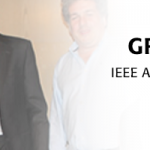Seeing Future Human Potential From Space at the 2017 EMBC Design Challenge
By Bruce Hecht
The Engineering in Medicine and Biology (EMBC) Annual Meeting was hosted this past week at Jeju Island, South Korea. This event is hosted every year, and includes keynote speakers such as Dr. Soyeon Yi, Korea’s first astronaut, who spoke at this year’s conference. It also includes Design Workshops and a Design Challenge. The IEEE Engineering in Medicine and Biology Society (EMBS) has hosted Design Workshops to build capacity for innovative ideas at each of the EMBC conferences since 2015. These workshops include the Design Challenge, which is an interactive portion of the event dedicated to exploring creative innovation.
This year, conference sessions focusing on Enhancing Human Potential showcased research results such as exoskeletons for increased hand strength, and the kinesiology of human interactions in Virtual Reality (VR) and Augmented Reality (AR). In addition to the Smarter Technology for a Healthier World. Dr. Soyeon Yi, Korean Astronaut and biomedical entrepreneur, was the Design Challenge Keynote Innovation Speaker, joining by live session after her presentation at this year’s International Space University. When asked about the most valuable experience from her time aboard the International Space Station, Dr. Soyeon Yi spoke about the opportunity for space discovery to draw people to work together across boundaries, and to see the value of seeing our home planet from a unique perspective.
These thoughts were echoed by the presentation made by Dr. Jim Yong Park at TED2017, co-founder of Partners in Health, and President of the World Bank. Dr. Park had issued a challenge to bring forward proposals that could address global health needs. Based on these calls to action, the Design Challenge participants used entrepreneurial models drawn from the Lean Startup Movement, and the Value Proposition Canvas (developed by Alex Osterwalder) to map out potential future directions, with a focus on engaging members of the IEEE, the EMBS, and those in our networks to innovate in two directions: exploring the potential of space science & engineering to generate new “gains” for biomedical and biotechnology, and applying what’s learned to reduce the “pains” of unmet needs on Planet Earth.
Next steps & Incentivized Prize Design for Health on Earth and in Space:
The EMBS initiative seeks to build a health challenge – drawing on the ideas of the Darpa Autonomous Vehicle Challenge and the Tricorder X-Prize. At 2016 Orlando and 2017 this year in Jeju, we have drawn on the expertise of Alan Zack and Yaniv Snir at Carrot in Los Angeles, and with Caty Byerly Rezendes of Rumblespring Design in Boston, to engage across disciplines to design an interactive world challenge for the future of health on Earth and in Space.
Connect with EMBS Design Challenge through Bruce.Hecht@IEEE.org to learn more and to join the challenge.






